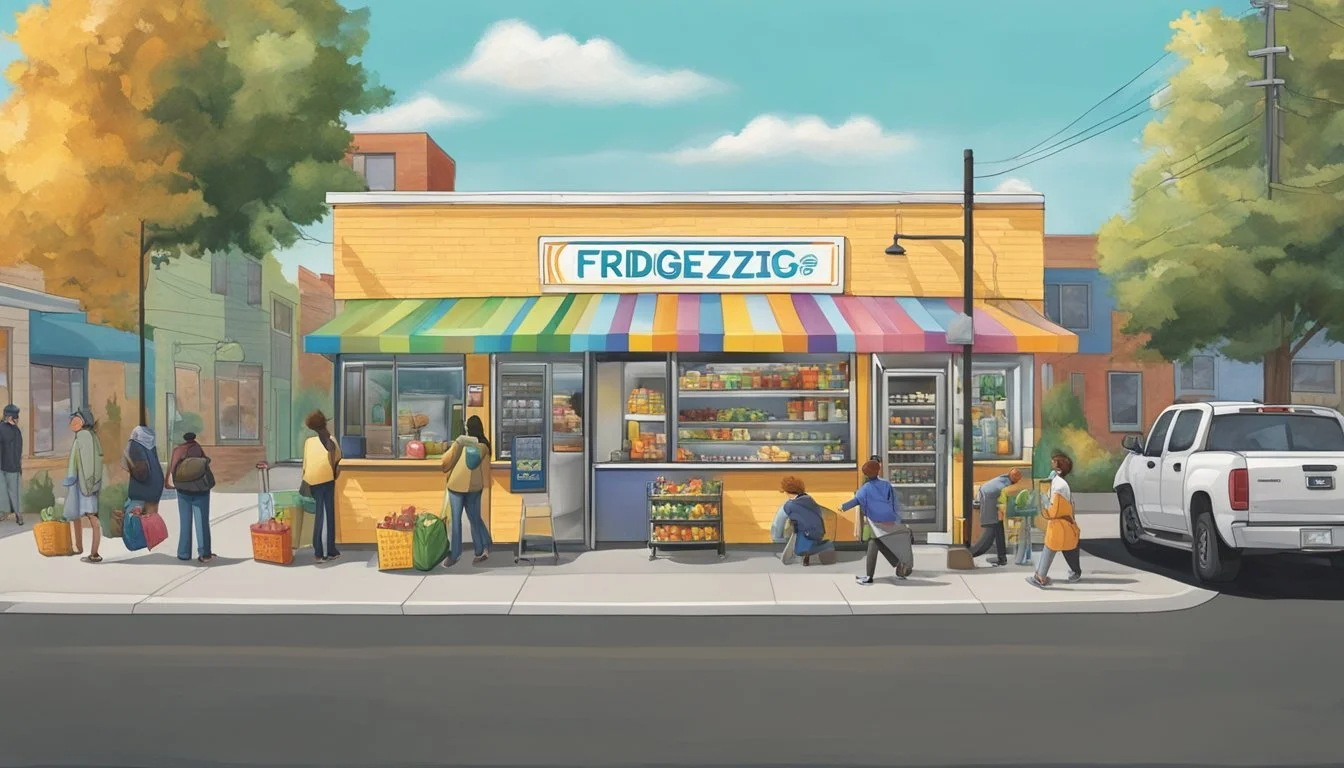Spokane, WA Community Fridge
A Hub for Sharing and Caring in the Community
In Spokane, WA, a refreshing approach to address food insecurity and waste has emerged through the establishment of community fridges. These fridges, placed across the city, are stocked with food donated by local businesses, farmers, and residents, and are accessible to anyone who needs it, 24/7. The concept is simple yet effective: take what you need, leave what you can.
The community fridge initiative in Spokane embodies the spirit of mutual aid and community support, creating an inclusive space where food is shared freely without any conditions. It operates on a trust basis and has been embraced by a wide range of people in the community, from those experiencing homelessness to families looking to stretch their budgets further.
These fridges not only serve as a resource for fresh, nutritious food but also foster a sense of community. They encourage residents to engage with one another and offer a platform for education about food waste and sustainability. Spokane's community fridges are more than just a stopgap for hunger; they are part of a growing movement to build resilient neighborhoods grounded in care and cooperation.
Origins and Development of Community Fridges
Establishing a community fridge involves strategic coordination of community support, legal compliance, and financial resources. Spokane's Community Fridge exemplifies an effective model for addressing local food insecurity.
Community Support and Involvement
Spokane's Community Fridge originated from a grassroots initiative, gaining momentum with the backing of local organizations and volunteers. These groups identified public locations where the refrigerators could be accessible to everyone, ensuring the community played a pivotal role in both contributions to and benefits from the project.
Legal Foundation and Guidelines
Setting up a community fridge required careful attention to legal requirements and health policies. Spokane's organizers worked closely with city officials to establish a framework that guarantees safe food handling practices while also protecting the project against potential liabilities.
Legal Requirements:
Compliance with health and safety regulations
Permits for operating in public spaces
Evolution of Spokane's Community Fridge
The first fridge set up was a proof of concept, demonstrating the public's willingness to engage with and support mutual aid systems. As the project met the legal criteria, additional fridges were introduced in other neighborhoods, creating a network of food sharing points across Spokane.
Financial and Material Contributions
The operational sustainability of Spokane's Community Fridge relied on consistent financial donations and food contributions. Local businesses and individual donors provided both monetary support and perishable goods, underlining the project's collaborative ethos.
Contributions:
Financial: Donations from citizens and local businesses
Material: Provision of fresh produce and pantry items
Through each of these focused efforts, Spokane's Community Fridge has evolved into a reliable resource for those facing food insecurity, fostering a strong sense of solidarity within the community.
Impact and Significance
The Spokane Community Fridge initiative has demonstrated significant effects on the local population by addressing critical issues such as food insecurity, environmental sustainability, and community cohesion. It has also received a notably positive response from the public.
Addressing Food Insecurity
In Spokane, the community fridge has become a symbol of hope for those facing food scarcity. It provides accessible and nutritious food, directly helping those who struggle to obtain enough to eat.
Food availability: The fridges ensure that fresh produce and other food items are available to the community, at no cost, 24/7.
Direct help: By offering immediate access to food, the fridge services alleviate hunger for many within the community.
Promoting Sustainability and Eco-Friendliness
The community fridges not only tackle hunger but also advocate for eco-friendly practices.
Waste reduction: Redirecting surplus food to the fridges prevents it from ending up in landfills, thus promoting sustainability.
Eco-education: They serve as practical examples of sustainability, educating the public on how to minimize food waste effectively.
Community Engagement and Volunteerism
Spokane's community fridges thrive due to the volunteers and groups offering their time and resources.
Volunteer involvement: A steady stream of volunteers contributes to stocking and maintaining the fridges, indicating strong community engagement.
Group efforts: Multiple groups work together to support the initiative, showing a united approach to communal health and well-being.
Public Perception and Reception
The initiative's reception has been generally favorable, with the public acknowledging its positive impact.
Public support: Many have expressed appreciation through reviews and continued donations, reflecting the broader community's endorsement.
Review feedback: Constructive feedback from the public often leads to the improvement of services provided by the fridges, ensuring they meet the community’s needs.
Operational Aspects
The Spokane, WA Community Fridge operates through concerted efforts ensuring efficient management, regular maintenance, and adherence to food safety guidelines.
Management and Coordination
Management skills are critical for the Spokane Community Fridge, where a dedicated manager oversees the services and coordination of the initiative. They ensure that contributions and distributions of food items are logged and managed systematically to prevent waste and to address the needs of the community effectively.
Appliance Maintenance and Upkeep
Regular maintenance of the appliances is paramount to the operation of the Spokane Community Fridge. The manager schedules routine checks and repairs to ensure the fridge remains hygienic and functioning at optimal levels. This includes:
Daily: Checking temperatures and cleanliness.
Weekly: Deep cleaning and inspection for wear or damage.
Monthly: Professional servicing for technical issues.
Storing and Handling of Food Items
The Spokane Community Fridge adheres to strict guidelines for storing and handling of food to ensure safety. Only food that complies with these guidelines is accepted:
Fresh produce is inspected for spoilage and arranged neatly.
Packaged items are checked for expiration dates and seal integrity.
Prepared foods must originate from a certified kitchen following all health standards.
These operational aspects form the backbone of the Spokane Community Fridge, creating a reliable resource for food sharing within the community.
Educational and Outreach Programs
In Spokane, WA, community fridges are supported by a variety of educational and outreach programs designed to foster food literacy, community involvement, and arts integration. These programs leverage local expertise to engage residents in the sustainable food movement.
Workshops and Information Sessions
The Spokane community fridge initiative regularly holds workshops and information sessions to educate the public on issues such as food waste reduction and the benefits of sharing resources. These events are geared toward providing practical advice on how to make the best use of community fridges:
Food Preservation Techniques: Learn methods to extend the shelf life of perishable food items.
Fridge Maintenance and Safety: Guidelines for maintaining cleanliness and ensuring food safety.
Collaboration with Local Artists and Businesses
Local artists and businesses play a critical role in the success of the community fridge by aiding in design and promotion. They collaborate to create vibrant fridge exteriors that reflect community values and attract attention to the cause:
Artistic Engagement: Artists contribute murals that turn fridges into community landmarks.
Business Partnerships: Businesses support through funding and volunteering, enhancing the project's reach.
Promotion of Healthy Eating and Nutrition
Community fridges are more than just food sharing locations—they are educational hubs where citizens can learn about healthy eating and nutrition. Education on these topics includes:
Nutrition Workshops: Dietitians and health professionals host sessions on balanced diets and nutrition facts.
Recipe Sharing: Community members exchange recipes that promote the use of ingredients commonly found in the fridges.
Fridge Locations and Accessibility
Community fridges in Spokane provide essential resources, facilitating easy access to free food for those in need. Through strategic placement and clear access policies, they enhance communal sharing.
Mapping of Fridge Sites
Community fridges are strategically located to serve various neighborhoods across Spokane. These sites are chosen for their visibility and ease of access for residents. One can find Spokane’s community fridges on N. Monroe St. and N. Division St., with future expansions planned to cover more areas.
Transportation and Proximity to Public Spaces
The locations of community fridges in Spokane are conveniently positioned near public transportation routes to allow for accessibility. The fridge on N. Monroe St. is a short distance from the Spokane Arena, while the one on N. Division St. is easily reachable off U.S. Route 2. Their proximity to these public spaces ensures that individuals who rely on public transport can access the fridges without extensive travel.
Access Policies and Usage Times
Spokane's community fridges operate under specific access policies to ensure fair use and regular availability. The fridge on N. Monroe St. is open Monday through Friday from 8:00 AM to 7:00 PM, aligning with community needs. The N. Division St. location extends its accessibility to weekends with hours on Saturday from 9:00 AM to 6:00 PM and Sunday from 10:00 AM to 5:00 PM. These schedules facilitate equitable food access for people with different work schedules and commitments.
Future Directions and Expansion
As Spokane's population grows, the community fridge initiative is looking at both expansion and innovation to meet increased demand and embrace new technologies.
Potential Locations for New Fridges
Spokane's community fridge program is targeting neighborhoods with higher rates of food insecurity and lower access to affordable nutrition. They are considering locations such as:
Community centers in underserved areas
Transit hubs for easy access
Partnership with local housing complexes
Each location is evaluated for foot traffic, safety, and the ability to maintain a power supply for the fridges.
Funding Strategies and Business Partnerships
Sustainable expansion relies on both consistent funding and solid business partnerships. Strategies include:
Monthly crowdfunding campaigns
Partnering with Spokane-based businesses for sponsorships and donations
Applying for grants from organizations supporting food security and tech innovations
Local businesses benefit from sponsorship by receiving positive community recognition and brand promotion.
Technological Integration and Innovation
Technological innovation is crucial for the efficiency and effectiveness of community fridges. The Spokane program plans to integrate:
Appliances that are energy-efficient and reduce operating costs
Remote monitoring systems to track stock levels and temperature
A mobile app to inform community members of fridge locations and available items
Growth in technology not only streamlines operations but also encourages community engagement with the program, making it more effective.
Appendix
The Appendix section provides comprehensive guidance on safety measures, volunteer coordination, and donor partnerships crucial to supporting the Spokane, WA Community Fridge.
Safety Regulations and Food Guidelines
The Spokane Community Fridge operates under strict safety regulations to ensure the well-being of all participants. Food donations must adhere to the following guidelines:
Perishables like dairy, meats, and prepared meals should be labeled with "use by" dates and stored appropriately.
Non-perishable items must be unopened and within the expiration date.
Food safety is paramount, and volunteers are trained to inspect and manage the inventory accordingly.
Volunteer Sign-Up and Organization
Volunteer organization is structured to maintain efficiency and service continuity:
Sign-up is available online, with slots for refrigerator management, food sorting, and community outreach.
Each volunteer undergoes an orientation, emphasizing safety and operation protocols.
The system ensures that all volunteers are well-informed and committed to the cause.
Donor Acknowledgments and Partnerships
Acknowledgment of donors and partnerships is integral to fostering community spirit and participation:
Donors receive appreciation certificates and are listed on the Community Fridge website.
Collaborative efforts with local businesses and organizations are key to sustaining the initiative.
Through strategic partnerships, the program expands its reach and impact in Spokane.









